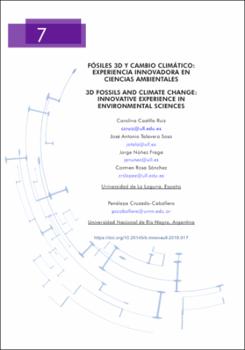Fósiles 3D y cambio climático: experiencia innovadora en Ciencias Ambientales
Fecha
2019Resumen
Se presentan conceptos claros, actualizaciones tecnológicas y la utilidad de los
recursos didácticos del entorno, como hilo conductor sobre las soluciones locales
a los cambios rápidos en la Naturaleza, y las consecuencias de un cambio climático
global hacia un progresivo calentamiento. Para ello se ha realizado un taller
titulado «Fósiles y Cambio de Clima» con un grupo de 40 alumnos/as de Ciencias
ambientales. Este taller consta de dos sesiones, una informativa y otra práctica
con fósiles reales, y modelos y réplicas 3D, seleccionados a partir del registro
fósil de Canarias del Neógeno y Cuaternario (últimos 23 millones de años). Para
la validación de los datos de las encuestas al alumnado sobre la motivación y
creatividad del taller, se utilizó un cuestionario previo de afección y conocimientos;
además, tras el taller, se cumplimentó un cuestionario de aprendizaje. Los
resultados son significativos, destacando de entre ellos, por su originalidad, el
uso de modelos 3D que favorece la distinción de organismos a nivel de especie.
Es evidente el interés del alumnado por aprender sobre la tecnología 3D, y que
el conocimiento del Cambio Climático a través de los fósiles se valora como una
manera motivadora y creativa para su aprendizaje. Clear concepts, technological updates and the usefulness of the didactic resources
of the environment are presented, as a common thread on local solutions to rapid
changes in nature, and the consequences of a global climate change towards a
progressive warming. For this purpose, a workshop entitled «Fossils and Climate
Change» was held with a group of 40 Environmental Science students. This workshop
consists of two sessions, one informative and another practice with real fossils,
and models and 3D replicas, selected from the Neogene and Quaternary fossil
record of the Canary Islands (last 23 million years). For the validation of the data
of the surveys to the students on the motivation and creativity of the workshop, a
previous questionnaire of affection and knowledge was used; In addition, after
the workshop, a learning questionnaire was completed. The results are significant,
highlighting among them, for their originality, the use of 3D models that favors
the distinction of taxa at the species level. It is evident the interest of the students
to learn about 3D technology, and that knowledge of Climate Change through
fossils is valued as a motivating and creative way for their learning.






